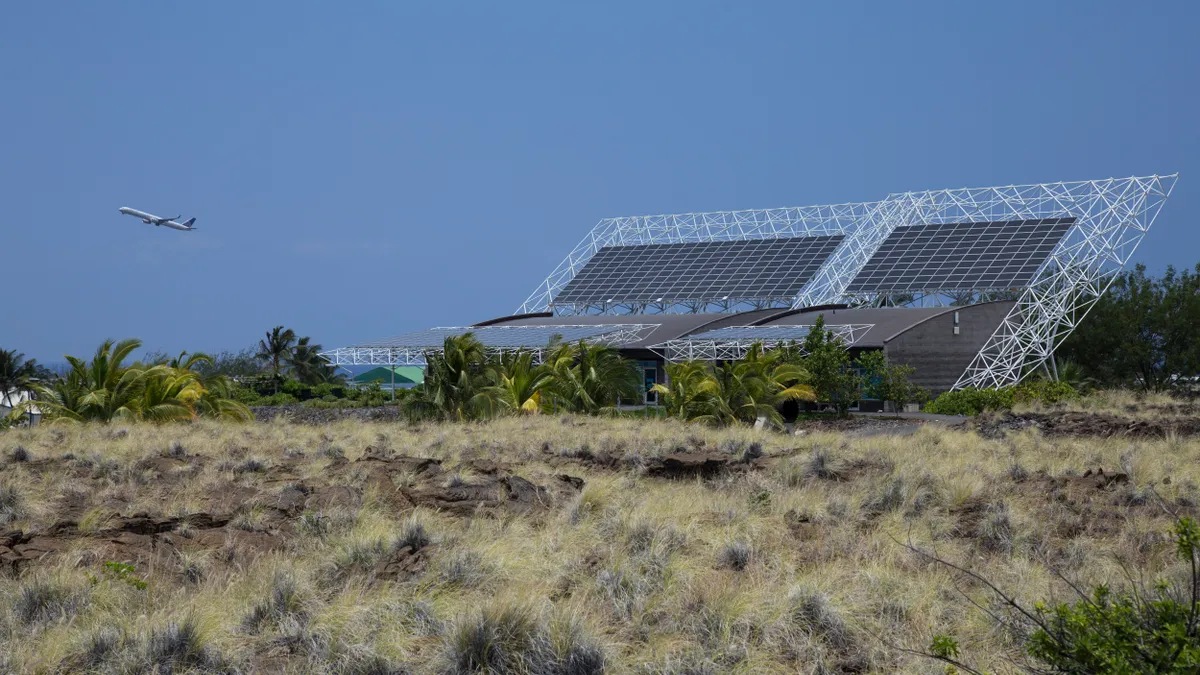Dive Brief:
-
Hawaiian Electric is planning to procure 460 MW of solar energy, along with nearly 3 GWh of storage, as part of its broader effort to transition to 100% renewable electricity by 2045, the company announced this week
-
The package includes 16 projects in Oahu, Maui and Hawaii, scheduled to come into operation starting in 2022. Collectively, they will increase Hawaiian Electric's total solar capacity by more than 50%.
- Meanwhile, Hawaiian Electric subsidiary Maui Electric is facing a district court complaint from the developer of a previously-announced solar-plus-storage system, who claims the utility "has been trying, in bad faith, to scuttle the PPA and the project." A hearing in that case is scheduled for July.
Dive Insight:
Hawaiian Electric now plans to begin negotiating with developers for the following projects:
| Island | # of Projects | Solar capacity (MW) | Storage (MWh) |
|---|---|---|---|
| Oahu | 9 | 287 | 1,800 |
| Maui | 4 | 100 | 560 |
| Hawaii (Big Island) | 3 | 72 | 492 |
The projects could be delayed depending on the economic repercussions of COVID-19, the company said in a press release. The utility's initial request for proposals sought 900 MW of renewables paired with storage. Projects were evaluated based on price, location, technology as well as community engagement plans.
"We went big with the scope of this request for proposals to see what the renewable energy market would support and to ensure lots of competition," Jim Alberts, senior vice president for business development and strategic planning, said in a press release.
"Even though these are all solar or low-profile storage projects, we know there's increasing concern about the location of renewable energy projects. That's why we say we need everyone working together — developers, government, communities and Hawaiian Electric — if we're going to meet our clean energy goals," he added.
Hawaiian Electric expects to be over 30% renewable by the end of the year and well over 40% by 2030, utility spokesperson Peter Rosegg told Utility Dive in an email.
Meanwhile, Maui Electric is facing a legal complaint from the developer of a planned 4.88 MW solar project, with a 3 MW/15MWh battery system, with whom the utility signed a power purchase agreement in early 2018. The project was approved by the Hawaii Public Utilities Commission in August 2018, and was expected to comprise half of Molokai's renewable energy capacity and reduce customer bills by $60 annually.
However, in a complaint filed with the U.S. District Court in late March, developer Molokai New Energy Partners (MNEP) contended that Maui Electric had breached their power purchase agreement.
MNEP alleges that the utility "consistently misrepresented" how long it would take to complete an interconnection requirements study, created delays and has refused to provide additional time to meet the deadline by which the project needs to be operational. Missing that deadline by 180 days would allow the utility to terminate the agreement, MNEP said in the complaint, causing it to lose several million dollars in investments.
Mike Luo, manager of MNEP, declined to comment as the matter is under litigation.
"We're disappointed the developer didn't follow through on its commitments and chose to go to court but we still have an agreement with MNEP and hope we can resolve the issues in the best interests of the Molokai community," Rosegg said in an email.
Maui Electric filed a motion to dismiss MNEP's complaint with the court on Monday. A hearing on the motion is scheduled for July 13.
"Unfortunately, this type of situation where a developer, whether local or from elsewhere, encounters years' worth of delays and flak from Hawaiian Electric is not at all uncommon, leading no small number of them to simply tap out after having spent millions," Marco Mangelsdorf, president of ProVision Solar, told Utility Dive in an email.
Emillia Noordhoek, president and founder of Northern Lights Studios, and former executive director of Sustainable Molokai, concurred. Noordhoek was a consultant for a planned community-solar project in Molokai, but the developer informed Maui Electric in late 2019 that it would be withdrawing from the process.
Projects can face "huge, onerous delays," she said, with processes that are too expensive and long.
"Developers simply don't have the appetite to wait it out," she said.















